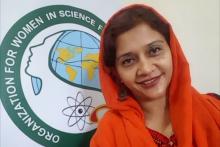High five for female researchers

Five women from developing countries are being honoured with an award for their research in the biological sciences.
The winning scholars are from Bangladesh, Bolivia, the Gambia, Nepal and Palestine, and are being recognised for their accomplishments in environmental microbiology, ethnobotany, clinical paediatrics and epidemiology. Some of their work includes creating sustainable bioplastics in Bangladesh and reducing disease transmission to new-borns in Africa.
Five researchers have been named winners of the 2019 OWSD-Elsevier Foundation Awards for Early-Career Women Scientists in the Developing World for their research in the biological sciences.
The winning scholars from Bangladesh, Bolivia, the Gambia, Nepal and Palestine are being recognised for their accomplishments in environmental microbiology, ethnobotany, clinical pediatrics and epidemiology. The prize also acknowledges the scientists’ commitment to leading and mentoring young scientists, and to improving lives and livelihoods in their communities and regions.
'These scientists are performing ground-breaking international-level science, often in circumstances where the deck has been stacked against them,' said Jennifer Thomson, president of the Organization for Women in Science for the Developing World (OWSD). 'They deserve to be honoured and celebrated for their dedication not only to their research, but to creating a better world for people to live in.'
The five researchers are:
- Tabassum Mumtaz of the Bangladesh Atomic Energy Commission (Asia Pacific region); in environmental microbiology (pictured);
- Uduak Okomo of the London School of Hygiene & Tropical Medicine in the Gambia (Africa region); in pediatrics and epidemiology;
- Narel Paniagua-Zambrana of the National Herbarium of Bolivia and Universidad Mayor de San Andres (Latin America and the Caribbean region); in ethnobotany;
- Tista Prasai Joshi of the Nepal Academy of Science and Technology (Asia Pacific region); in environmental microbiology; and
- Amira Shaheen of An-Najah National University in Palestine (Arab region); in epidemiology.
Ylann Schemm, director of the Elsevier Foundation, said: 'Each year, it is inspiring to find out just how much of the research undertaken by our winning scientists focuses on crucial challenges addressed by the UN Sustainable Development Goals: creating sustainable bioplastics in Bangladesh; preserving traditional plant knowledge in Bolivia; reducing disease transmission to newborns in Africa; removing arsenic from water in Nepal; and investigating the health care system response to gender violence in Palestine. In addition, working with OWSD and the AAAS to celebrate the success of these talented women scientists is both an honor and a joy.'
First awarded in 2011, the awards are given in partnership by OWSD and the Elsevier Foundation. OWSD chairs a panel of distinguished scientists to select the winners, and the Elsevier Foundation supports a cash prize for each winner of $5,000 and an all-expenses-paid trip to attend the annual meeting of the American Association for the Advancement of Science (AAAS), this year in Washington, D.C.







